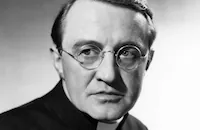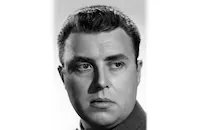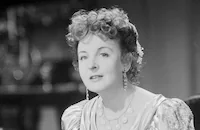Three Strangers

Brief Synopsis
Cast & Crew
Jean Negulesco
Sydney Greenstreet
Geraldine Fitzgerald
Peter Lorre
Joan Lorring
Robert Shayne
Film Details
Technical Specs

Synopsis
In London, during Chinese New Year in 1938, Crystal Shakleford brings two strangers, Jerome K. Arbutny and John West, to her apartment. There, Crystal keeps a statue of the Chinese goddess Kwan Yin, which according to legend, will open its eyes and heart to three strangers at the stroke of midnight, and whatever they ask for, it will grant. West suggests that the others buy into his sweepstakes ticket, and they agree that if their horse is chosen, they will not sell the ticket, but will hold it until the Grand National is run. While they wait for midnight, Crystal says she will use her share of the money to get her husband back; Arbutny hopes the money will ensure his election to the Barrister's Club; and West wants to buy a bar so that he can drink in peace. Before the clock is finished striking, a breeze extinguishes the candle lighting the idol, making it impossible to determine if her eyes actually open. After the men leave, Crystal's husband David arrives and, when she begs him to return, explains that he has fallen in love with Janet Elliott and has only come to ask her for a divorce. West, meanwhile, returns to the room where he has been hiding after a robbery in which he was an innocent participant ended in murder. Waiting with him are Gabby and Icy Crane, who is to provide the alibi for Fallon, the murderer, who is now in jail. Arbutny has been embezzling from the account of Lady Rhea Belladon, a widow who believes that she can communicate with her dead husband. At Fallon's trial, Icy's statement is revealed to be a lie, so Fallon changes his plea to guilty and accuses Gabby and West of participating in the murder. Later, while trying to escape, West is arrested. A vengeful Crystal visits her husband's superior and reveals that he has left her for another woman. She then visits Janet and lies that David is coming back to her because she is pregnant. Arbutny proposes marriage to Lady Rhea, and this uncharacteristic action prompts her to have her books examined, as advised by her dead husband. Exposed as a thief, Arbutny prepares to kill himself when he sees in the paper that his sweepstakes horse will run. He immediately tries to convince Crystal to sell the ticket, but she reminds him that they agreed to let the bet ride on the race. Gabby, meanwhile, attacks Fallon while he is on his way to prison, and before he dies, Fallon clears West. After his release, West learns about the results of the sweepstakes and hurries to Crystal's apartment. Meanwhile, when he cannot convince Crystal to sell the ticket, a desperate Arbutny kills her with the statue of Kwan Yin. Ironically, their horse wins the race, but because they need Crystal's signature on the ticket, the men cannot collect their reward. Driven crazy by his act, Arbutny confesses the murder to the police. West returns to the bar to get drunk, and Icy, who has fallen in love with him, joins him to laugh over their fate.

Director

Jean Negulesco
Cast

Sydney Greenstreet

Geraldine Fitzgerald

Peter Lorre

Joan Lorring

Robert Shayne
Marjorie Riordan

Arthur Shields

Rosalind Ivan

John Alvin

Peter Whitney

Alan Napier
Clifford Brooke

Doris Lloyd
Colin Kenny

Holmes Herbert
Eric Wilton
Keith Hitchcock

Ian Wolfe
Stanley Logan
Benny Burt
Connie Leon
Leland Hodgson
Norman Ainsley
Olaf Hytten
Leslie Denison
Alec Craig
Reginald Sheffield
Woodrow Chamblis
Tom Pilkington
Creighton Hale
Leo White
Stanley Mann
John Burton
Cyril Delevanti
Crew
Gerald W. Alexander
George Amy
Milo Anderson
Clifford Brooke
Murray Cutter
Paul Detlefsen
Edwin Du Par
Arthur Edeson
Leo F. Forbstein
Charles David Forrest
John Huston
Howard Koch
William Mcgann
James Mcmahon
George Nogle
Fredrik T. Nyquist
Max Parker
Wolfgang Reinhardt
Rob Rhodes
C. A. Riggs
Ted Smith
Eric Stacey
Clarence Steensen
Jack L. Warner
Robert G. Wayne
Perc Westmore

Videos
Movie Clip



Trailer
Hosted Intro
Film Details
Technical Specs

Articles
Geraldine Fitzgerald (1913-2005)
Born in Dublin on November 24, 1913, Fitzgerald was educated for a time in a convent school in London. Back in her native Dublin, she happily accompanied her aunt, the Irish actress Shelah Richards, to a theater one afternoon when the director mistook her for an actress, and instructed her "to go backstage and change." An inauspicious start, but it gave her the acting bug. She made her stage debut in 1932 in Dublin's Gate Theater and later appeared in a few forgettable British films: Open All Night (1934), The Ace of Spades, Three Witnesses (both 1935). She made the trip across the Atlantic in 1938 to act with Orson Welles and his Mercury Theater, but agents from Warner Bros. quickly signed her and she was soon off to Hollywood.
She made her film debut in 1939 supporting Bette Davis in Dark Victory, but it was her performance in a second film later in the year that proved to be the most memorable of her career - the role of Isabella Linton in Wuthering Heights. She earned an Oscar® nomination for her turn and stardom should have been around the corner, but Fitzgerald's feuding with studio head Jack Warner (he refused to let her return to the New York stage and she would refuse parts that she thought were inferior) led to some lengthy suspensions of unemployment. Irregardless, Fitzgerald still had some shining moments at Warner Bros. the heady melodrama The Gay Sisters (1942); the superb espionage thriller Watch on the Rhine (1943); Robert Siodmak's terrific, noirish thriller The Strange Affair of Uncle Harry (1945); and a tough crime drama where she played opposite John Garfield Nobody Lives Forever (1946).
Fitzgerald returned to New York by the '50s, and found much work in many of the live television dramas that were so popular in the day: Goodyear Television Playhouse, Lux Video Theatre, Studio One, Schlitz Playhouse of Stars; and even some taped television shows: Naked City, Alfred Hitchcock Presents in between her stage demands.
She did return to the screen by the mid-'60s and proved herself a fine character actress in films like The Pawnbroker (1965); Rachel, Rachel (1968); Harry and Tonto (1974); a wonderfully memorable comic turn as Dudley Moore's feisty grandmother in Arthur (1981); and yet another noteworthy performance as Rose Kennedy in the acclaimed mini-series Kennedy (1983). She also appeared in a few television programs: St. Elswhere, Cagney & Lacey, and The Golden Girls before ill-health forced her to retire by the early '90s. Among the relatives that survive her are her son, director Michael Lindsay-Hogg (Brideshead Revisited; a daughter, Susan Scheftel; and her great-niece, the English actress Tara Fitzgerald.
by Michael "Mitch" Toole

Geraldine Fitzgerald (1913-2005)
Three Strangers - Three Strangers
An atmospheric melodrama with film noir shadings, Three Strangers (1946) bears some similarities to a previous Warner Bros. production (The Maltese Falcon, 1941), particularly in its focus on a statuette (a bust of the Chinese idol Kwan Yin) that sets the plot in motion. It also reunites Falcon cast members Greenstreet and Lorre, the two resident studio "heavies" at that time. Yet, despite the film's somewhat derivative nature, it was actually a precursor to The Maltese Falcon.
John Huston originally came up with the Three Strangers storyline in 1936 when he worked briefly for the film company Gaumont-British in London. According to his autobiography, An Open Book, the idea for the film was inspired by a wooden figure (possibly from Burma) he had purchased in a British antique shop. At a social gathering at his London flat, the exotic carving took on greater significance: "Somebody present had a sheet of Irish Sweepstakes tickets, and it was proposed that we sign with a pseudonym. "Burmese" sounded like a good pseudonym to me, so I took some tickets jointly and some singly, and signed them "Burmese." "Burmese" put an idea into my head for story. Three strangers purchase a sweepstakes ticket and sign it using the name of a goddess. The ticket is drawn in the lottery but, meanwhile it has become a clue connecting one of the trio with murder. Thereafter the goddess sees to it that nobody gets anything but his just desserts. I told Angus MacPhail this notion and he liked it very much. There was a director there who had a penchant for this kind of material, so Angus had me tell him the story of Three Strangers. The director - whose name was Alfred Hitchcock - liked it also, but apparently the Balcon brothers did not, and that was the last I heard of it."
Huston returned to Hollywood shortly after his unrewarding stint in England and found work at Warner Bros. where he completed a screenplay of Three Strangers (based on his short story "Three Men and a Girl") with his friend Howard Koch (he would go on to co-write the screenplay for Casablanca, 1942); the two had met while Huston was performing in a London stage production of The Lonely Man, written by Koch.
Flash forward ten years and Warner Brothers is finally preparing to film Three Strangers but Huston, by now a well-regarded director, is unable to helm the project; his involvement in the war effort as a Signal Corps lieutenant prevents him from immediately returning to Hollywood so Jean Negulesco is hired instead. It was Huston's initial plan to star Humphrey Bogart, Sydney Greenstreet and Mary Astor as the unlucky trio but of the three only Greenstreet remained attached to the project. Nevertheless, Geraldine Fitzgerald is outstanding as the ill-fated Crystal and Lorre, in one of his few non-villainous roles, is even allowed a romantic interest, a rarity in his screen career. As for Three Strangers, it mirrors themes and motifs - the roles of fate, self-awareness, and human weaknesses in a character's destiny - that would recur throughout Huston's work from The Treasure of the Sierra Madre (1948) to Prizzi's Honor (1985) and is essential viewing for fans of his work.
Producer: Wolfgang Reinhardt
Director: Jean Negulesco
Screenplay: John Huston, Howard Koch
Cinematography: Arthur Edeson
Film Editing: George J. Amy
Art Direction: Ted Smith
Music: Adolph Deutsch
Cast: Sydney Greenstreet (Jerome K. Arbutny), Peter Lorre (Johnny West), Geraldine Fitzgerald (Crystal Shackleford), Joan Lorring (Icey), Robert Shayne (Fallon), Marjorie Riordan (Janet).
BW-93m. Closed captioning.
by Jeff Stafford
Three Strangers - Three Strangers
Quotes
Trivia
Notes
The film starts with the following written foreword: "It has always been man's nature to invent idols on whom he could place the responsibility for his own actions. Perhaps these three strangers in this story, whose lives have really nothing to do with each other, would never have met except for a very ancient idol: the Chinese goddess, Kwan Yin. And perhaps their separate stories might have been different except for what happened that night. And then again, perhaps not." According to a June 12, 1939 Los Angeles Times news item, Bette Davis and George Brent were expected to star in the film. At that time, the story was entitled Three Men and a Girl. A treatment of that story, written by John Huston, was purchased by Warner Bros. in 1937, according to memos reproduced in a modern source. An undated contemporary press release names Humphrey Bogart, Sydney Greenstreet and Mary Astor, co-stars of the popular 1941 Warner Bros. picture The Maltese Falcon, as the prospective stars of the film. Modern sources list additional actors considered for the leading roles: For "Arbutny," Lionel Atwill, Donald Crisp, Ian Hunter and Claude Rains; for "Crystal," Miriam Hopkins and Kay Francis; and for "West," Errol Flynn, David Niven, Leslie Howard, Douglas Fairbanks, Jr. and Robert Montgomery.
















